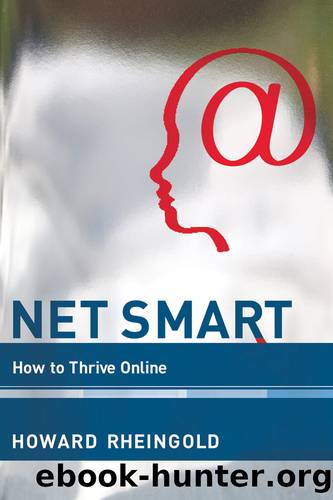Net Smart by Howard Rheingold

Author:Howard Rheingold [Rheingold, Howard]
Language: eng
Format: epub
ISBN: 9780262300728
Publisher: The MIT Press
Published: 2012-06-14T16:00:00+00:00
Collective Intelligence: When All of Us Can Be Smarter Than Any of Us
Wikipedia, as I discuss in Convergence Culture, depends on what Pierre Lévy calls “collective intelligence.” In the classic formulation, collective intelligence refers to a situation where nobody knows everything, everyone knows something, and what any given member knows is accessible to any other member upon request on an ad hoc basis. Lévy is arguing that a networked culture gives rise to new structures of power which stem from the ability of diverse groups of people to pool knowledge, collaborate through research, debate interpretations, and through such a collaborative process, refine their understanding of the world.
—Henry Jenkins, “Collective Intelligence vs. the Wisdom of Crowds,” 2006
Collective intelligence comes in many flavors. A tribe of television fans known as “spoilers” mobilize a kind of collective intelligence on a global scale in order to outwit the secretive producers of programs such as Survivor by figuring out who is going to win before the official announcement. Because the Survivor series is recorded months before it is broadcast, with the cast and crew sworn to secrecy, only a few people know who the final surviving winner is before the announcement. By talking to bartenders in hotels where the cast might have stayed, piecing together small pieces of information contributed by members of the online spoilers community, and arguing vociferously online about what the evidence means, spoiler communities have rivaled intelligence services in their ability to collectively sleuth out the answers.
Jenkins, McGonigal, Brown, and the Ito siblings believe that what might appear to be esoteric practices of digital subcultures might also be harbingers of the kind of networked problem solving that people will be doing more often in the face of more serious objectives. Wikipedia, which I’ll look at shortly, is certainly the product of a culturally evolved collective intelligence that integrates the large and small efforts of many, resolves editing disputes, and maintains self-healing procedures to protect against vandalism. With the aid of crowdsourced citizen data gatherers, some scientists think that science—one of the most potent forms of collective intelligence—could be accomplished through mass collaboration. The groups of bloggers who investigated and eventually caused the resignations of Lott and Rather, the bloggers who organized the Sinclair Broadcast Group boycott, and the reconstructors of the Lost Ring fictional Olympic game all exhibited characteristics of collective intelligence—a networked rather than hierarchical command-and-control structure; a means of fitting together small contributions of many participants utilizing intracommunity forums for discussing, sharing, and arguing about their collaboration along with what it means.
In the late 1990s, University of Ottawa professor Pierre Lévy built on existing ideas of “global brains” and “mass minds” by H. G. Wells, Howard Bloom, and others in his book Collective Intelligence: Mankind’s Emerging World in Cyberspace.25, 26, 27 Lévy sees collective intelligence as an aggregation of skills, understanding, and knowledge: skills, like literacies, unlock individual access, which must be actively used to acquire individual knowledge from the great collective pool
Download
This site does not store any files on its server. We only index and link to content provided by other sites. Please contact the content providers to delete copyright contents if any and email us, we'll remove relevant links or contents immediately.
Cecilia; Or, Memoirs of an Heiress — Volume 1 by Fanny Burney(32008)
Cecilia; Or, Memoirs of an Heiress — Volume 3 by Fanny Burney(31431)
Cecilia; Or, Memoirs of an Heiress — Volume 2 by Fanny Burney(31374)
The Great Music City by Andrea Baker(30623)
We're Going to Need More Wine by Gabrielle Union(18588)
All the Missing Girls by Megan Miranda(14532)
Pimp by Iceberg Slim(13698)
Bombshells: Glamour Girls of a Lifetime by Sullivan Steve(13658)
Fifty Shades Freed by E L James(12876)
Talking to Strangers by Malcolm Gladwell(12801)
Norse Mythology by Gaiman Neil(12758)
For the Love of Europe by Rick Steves(11316)
Crazy Rich Asians by Kevin Kwan(8849)
Mindhunter: Inside the FBI's Elite Serial Crime Unit by John E. Douglas & Mark Olshaker(8653)
The Lost Art of Listening by Michael P. Nichols(7108)
Enlightenment Now: The Case for Reason, Science, Humanism, and Progress by Steven Pinker(6847)
The Four Agreements by Don Miguel Ruiz(6274)
Bad Blood by John Carreyrou(6247)
Weapons of Math Destruction by Cathy O'Neil(5781)
